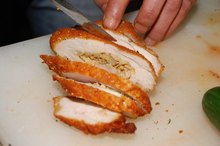What does fact checked mean?
At Healthfully, we strive to deliver objective content that is accurate and up-to-date. Our team periodically reviews articles in order to ensure content quality. The sources cited below consist of evidence from peer-reviewed journals, prominent medical organizations, academic associations, and government data.
- MedlinePlus: Dietary Fats Explained
- Journal of the International Society of Sports Nutrition: International Society of Sports Nutrition Position Stand: Protein and Exercise
- International Journal of Sport Nutrition and Exercise Metabolism: Nutritional Strategies to Promote Postexercise Recovery
- International Journal of Sport Nutrition and Exercise Metabolism: Nutritional Strategies to Promote Postexercise Recovery
The information contained on this site is for informational purposes only, and should not be used as a substitute for the advice of a professional health care provider. Please check with the appropriate physician regarding health questions and concerns. Although we strive to deliver accurate and up-to-date information, no guarantee to that effect is made.
The Difference Between Muscle Milk & Muscle Milk Collegiate
Sports nutrition products -- Muscle Milk and Muscle Milk Collegiate -- are manufactured by Cytosport. While these supplements are both intended to aid in improving body composition and strength when combined with a workout program, Muscle Milk and Muscle Milk Collegiate do have significant nutritional differences. In spite of the potential benefits, you should consult a doctor prior to using these or any other supplements to assess potential side effects.
Calorie Content
Muscle Milk and Muscle Milk Collegiate are quite different in calorie content. One serving of Muscle Milk Collegiate provides 580 calories, while one serving of Muscle Milk contains 310 calories. The difference of 270 calories can be significant if you consume these supplements often. If you switch from one serving of Muscle Milk to one serving of Muscle Milk Collegiate each day, you'd take in an additional 1,890 calories each week, enough to gain more than half of a pound of muscle over the course of a week.
- Muscle Milk and Muscle Milk Collegiate are quite different in calorie content.
- One serving of Muscle Milk Collegiate provides 580 calories, while one serving of Muscle Milk contains 310 calories.
Fat Content
How Long Should You Wait After a Meal to Drink Muscle Milk?
Learn More
Although Muscle Milk Collegiate is much richer in calories, it is lower in fat than Muscle Milk. Each serving of Muscle Milk Collegiate contains 7 grams of fat, with 3 grams of saturated fat, while Muscle Milk provides 12 grams of fat, with 6 grams of saturated fat. Dietary fat can be beneficial for athletic pursuits and building muscle, as dietary fat aids in the absorption of nutrients and provides energy during long bouts of exercise.
Protein Content
Muscle Milk and Muscle Milk Collegiate are rich in protein, but Muscle Milk Collegiate offers more. One serving of Muscle Milk Collegiate contains 40 grams of protein, while one serving of Muscle Milk contains 32 grams of protein. Consuming protein can aid in gaining muscle because it contains the amino acids used to build your body's tissues. The 2007 "Journal of the International Society of Sports Nutrition" suggests that eating up to 2 grams of protein per kilogram of body weight each day can help you maximize your muscle gains and it is a safe amount 3.
- Muscle Milk and Muscle Milk Collegiate are rich in protein, but Muscle Milk Collegiate offers more.
Carbohydrate Content
How to Make a Muscle Milk Shake
Learn More
Muscle Milk Collegiate and Muscle Milk vary dramatically in carbohydrate content. Muscle Milk Collegiate provides 90 grams of carbohydrates in each serving, while Muscle Milk contains 18 grams of carbohydrates per serving. Carbohydrates provide your body with energy, so carbohydrate-rich foods can be beneficial for athletes. Additionally, research from the December 2010 issue of the "International Journal of Sport Nutrition and Exercise Metabolism" suggests that consuming carbohydrates with protein can also enhance recovery after workouts 34.
- Muscle Milk Collegiate and Muscle Milk vary dramatically in carbohydrate content.
- Muscle Milk Collegiate provides 90 grams of carbohydrates in each serving, while Muscle Milk contains 18 grams of carbohydrates per serving.
Related Articles
References
- HelpGuide.org: Healthy Weight Loss & Dieting Tips
- MedlinePlus: Dietary Fats Explained
- Journal of the International Society of Sports Nutrition: International Society of Sports Nutrition Position Stand: Protein and Exercise
- International Journal of Sport Nutrition and Exercise Metabolism: Nutritional Strategies to Promote Postexercise Recovery
- Milk, reduced fat (2%). FoodData Central. U.S. Department of Agriculture. Published April 1, 2019.
- Månsson HL. Fatty acids in bovine milk fat. Food Nutr Res. 2008;52. doi:10.3402/fnr.v52i0.1821
- Wadolowska L, Sobas K, Szczepanska JW, Slowinska MA, Czlapka-Matyasik M, Niedzwiedzka E. Dairy products, dietary calcium and bone health: possibility of prevention of osteoporosis in women: the Polish experience. Nutrients. 2013;5(7):2684-707. doi:10.3390/nu5072684
- Varenna M, Manara M, Galli L, Binelli L, Zucchi F, Sinigaglia L. The association between osteoporosis and hypertension: The role of a low dairy intake. Calcif Tissue Int. 2013;93(1):86-92. doi:10.1007/s00223-013-9731-9
- Cormick G, Ciapponi A, Cafferata ML, Belizán JM. Calcium supplementation for prevention of primary hypertension. Cochrane Database Syst Rev. 2015;(6):CD010037. doi:10.1002/14651858.CD010037.pub2
- National Cancer Institute. Calcium and cancer prevention. Updated May 4, 2009.
- Radavelli-Bagatini S, Zhu K, Lewis JR, Dhaliwal SS, Prince RL. Association of dairy intake with body composition and physical function in older community-dwelling women. J Acad Nutr Diet. 2013;113(12):1669-74. doi:10.1016/j.jand.2013.05.019
- Josse AR, Tang JE, Tarnopolsky MA, Phillips SM. Body composition and strength changes in women with milk and resistance exercise. Med Sci Sports Exerc. 2010;42(6):1122-30. doi:10.1249/MSS.0b013e3181c854f6
- Rautiainen S, Wang L, Lee IM, Manson JE, Buring JE, Sesso HD. Dairy consumption in association with weight change and risk of becoming overweight or obese in middle-aged and older women: a prospective cohort study. Am J Clin Nutr. 2016;103(4):979-88. doi:10.3945/ajcn.115.118406
- Flom JD, Sicherer SH. Epidemiology of cow's milk allergy. Nutrients. 2019;11(5). doi:10.3390/nu11051051
Writer Bio
Brian Willett began writing in 2005. He has been published in the "Buffalo News," the "Daytona Times" and "Natural Muscle Magazine." Willett also writes for Bloginity.com and Bodybuilding.com. He is an American Council on Exercise-certified personal trainer and earned a Bachelor of Arts in journalism from the University of North Carolina.









